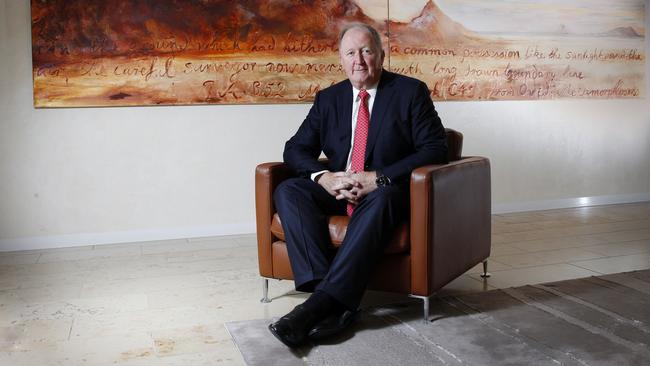Rio Tinto’s finance director Chris Lynch steps down
Rio Tinto finance director Chris Lynch says the decision to step down from the mining giant was a personal one.

Rio Tinto finance director Chris Lynch says the decision to step down from the Anglo-Australian mining giant was a personal one, made with the company in good shape to return cash to shareholders after four years of hard-driving cost gains and balance sheet repair.
The Broken Hill-born mining industry veteran, who has given up to a year’s notice of his plans to leave, turned 64 on Saturday.
And he says 65 is a good age to again leave executive ranks.
“It’s purely a personal decision,” Mr Lynch told The Australian.
“The company is in great shape, I’m very happy with where the balance sheet is, the cost structure is good and JS (chief executive Jean-Sebastien Jacques) has a pretty energised team heading it up.”
And funds are again flowing to shareholders, with $US4.2 billion ($5.3bn) of dividends announced so far this year and another $US4bn of buybacks (including $US2.5bn of sale proceeds from Australian thermal coal assets).
The returns come despite Rio abandoning a progressive dividend policy in early 2016 to focus on debt repayment.
It was replaced with a more flexible policy of returning 40-60 per cent of underlying earnings through the cycle.
“We’ve been able to embed the policy, and each time we’ve had a chance to make a decision about it, we’ve gone in favour of the shareholder pretty strongly,” Mr Lynch said.
The returns should continue in February with a final year dividend that brings the full-year dividend to an expected record $US2.50 a share, meaning that the payout is once again progressive, despite the policy change.
The record dividend is expected because the business is spinning off free cash thanks to cost-cutting and capital discipline measures started by Mr Lynch and former chief executive Sam Walsh, capital restraint, and rising commodities prices.
And acquisitions — the only real competitor for free cash use now net debt of $US11bn is down where Rio wants it and there are no big unapproved growth projects on the horizon — are unlikely.
“Good value acquisitions are few and far between; you’re not going to steal anything,” Mr Lynch said. “The only other things that come are if you can do better than the existing owner ... it’s tough to get acquisitions to stack up in my view.”
Rio announced late on September 15 that Mr Lynch would retire some time in the next year, after being queried on the matter by Australian and British journalists.
Mr Lynch, a former BHP Billiton chief financial officer, joined Rio as a non-executive director in 2011 and stepped down from his position as Transurban chief executive in 2012.
But his non-executive stint did not last long.
In 2013, he became Rio’s finance director soon after chief executive Tom Albanese was sacked over the effective complete write-off of a $4bn Mozambique coal acquisition. and replaced by Mr Walsh.
The pair then set about steadying a Rio ship that had been rocking wildly since a disastrous $US40bn acquisition of Alcan in 2007. “We’ve been on the journey the entire time I’ve been here, so it hasn’t happened quickly,” Mr Lynch said of the cost-cutting drive.
Rio has removed a stunning $US8.2bn of annual costs since the start of 2013. “Some of it was cyclical, because the cost of capex came down once the real heat came out of the expansion mode of the industry,” Mr Lynch said.
“But I’ve been very happy with what’s been achieved in a concerted effort across the entire company ... it has been really satisfying the way the whole company got involved in the process.”
The CFO’s planned departure continues a rapid turnover of Rio’s senior executive ranks since Mr Jacques took over from Mr Walsh in July last year.
Aluminium chief Alf Barrios, who joined Rio in 2014, will be the only executive committee member surviving from Mr Walsh’s time.
And chairman Jan du Plessis has announced he will step down by Rio’s next annual general meeting, in May.
Mr Lynch’s departure, assuming no new board appointments, would leave the company with just two Australian directors — Megan Clark and Michael L’Estrange.
There have not been so few local directors on the board since 2009, when Rio realised it needed to strengthen its Australian credentials.
This was after it took a proposed Chinalco merger to Canberra only to be informed a perceived failure to fulfil commitments made in 1995, when CRA and Rio Tinto Zinc merged, had harmed its plight to gain trust over the deal.
The company then made iron ore boss Sam Walsh an executive director and gave him responsibility for all Australian operations. By 2014 it had five Australian directors.
Mr Lynch said he hoped the London-headquartered Rio would keep a strong Australian presence on the board.
“Australia is obviously a massive part of the company and it is a massive part of our history and DNA, it’s hugely important,” Mr Lynch said. “We’ve got two excellent Aussie directors on the board now with Megan Clark and Michael L’Estrange … if there was scope for more, that would be good, but it (the board) is in pretty good shape.”
Mr Lynch plans to return from London to Australia to live after his retirement.

To join the conversation, please log in. Don't have an account? Register
Join the conversation, you are commenting as Logout